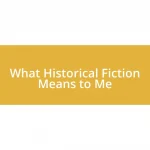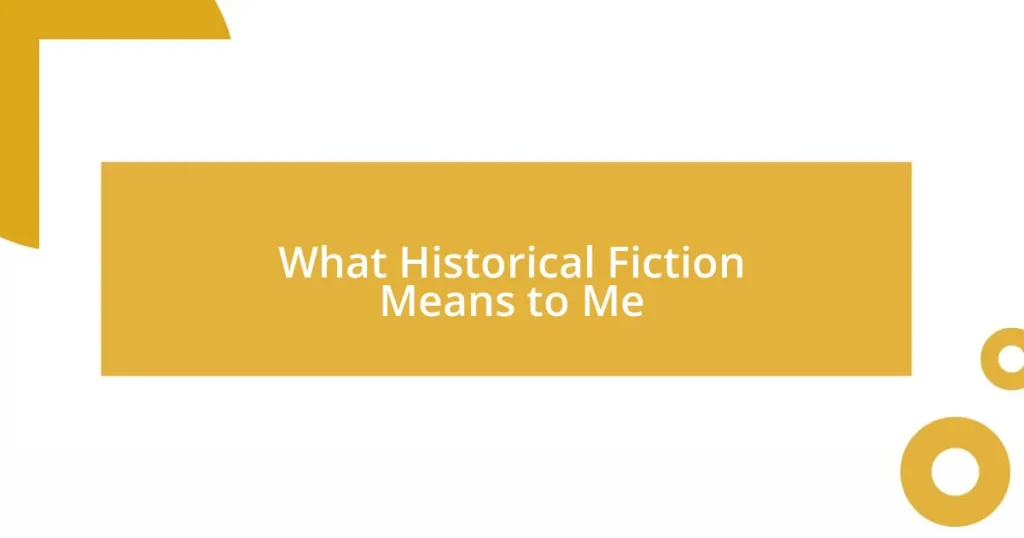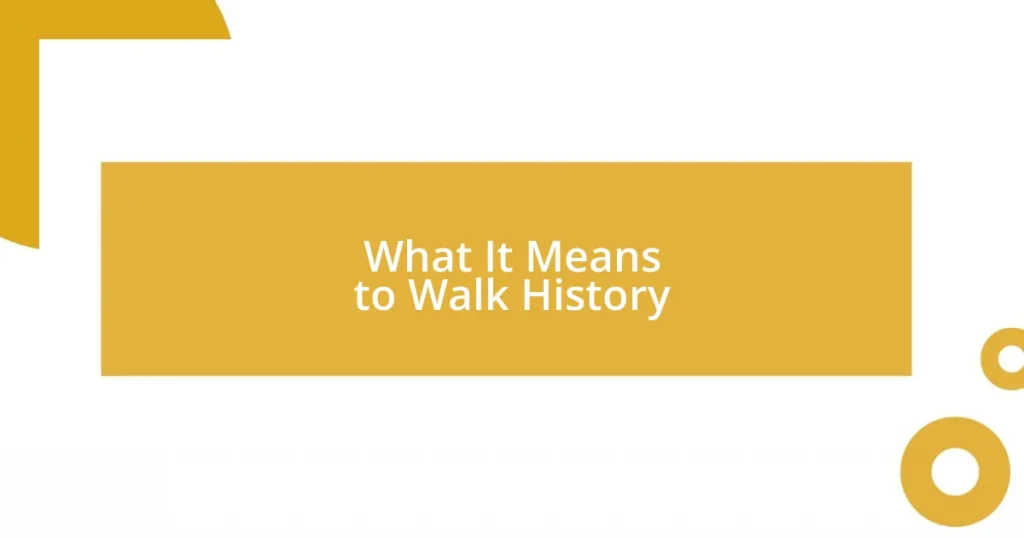Key takeaways:
- Historical fiction merges real events with engaging narratives, making the past relatable and educational.
- Understanding the context of a story enhances empathy and reflection on contemporary issues.
- Character development reflects societal norms, illustrating the complexity of human relationships across eras.
- The setting serves as a crucial element, influencing characters’ actions and inviting deeper engagement with history.
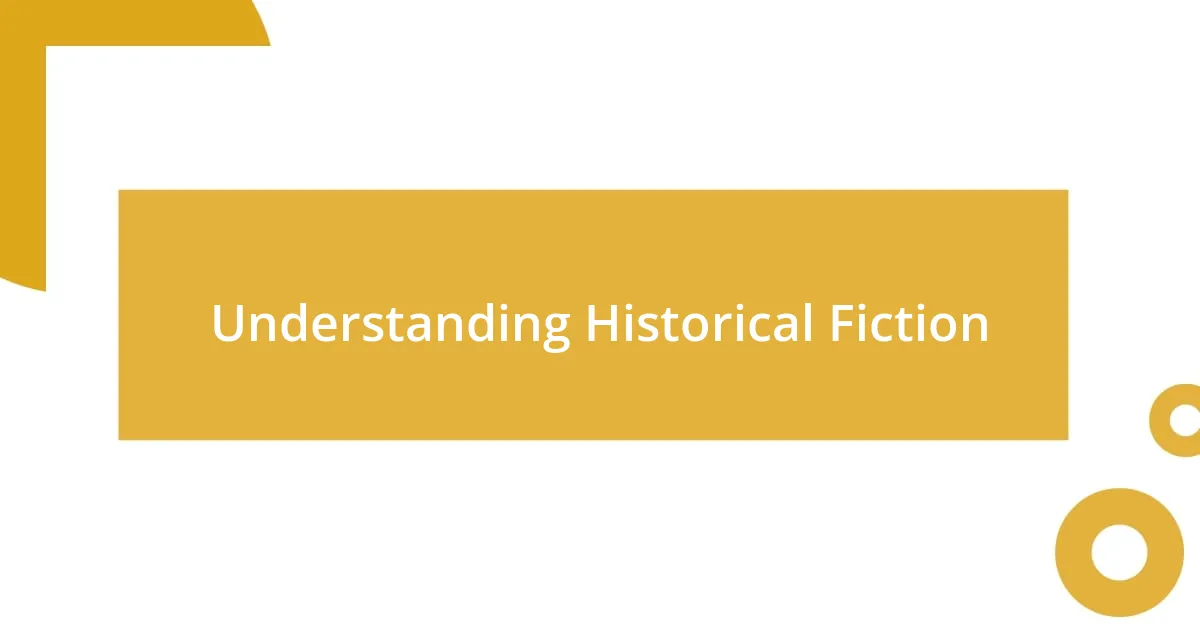
Understanding Historical Fiction
When I delve into historical fiction, I find it fascinating how authors weave real events and figures into compelling narratives. I remember picking up a novel about World War II and feeling a profound connection to the characters as they navigated life during such tumultuous times. Isn’t it incredible how a story can make the past feel so vivid and relatable?
Historical fiction serves not only to entertain but also to educate. It provides a window into worlds we may never experience firsthand while resonating with our contemporary emotions and struggles. I often reflect on how a character’s moral dilemmas can mirror our own decisions today. Have you ever read something that made you question your views on history?
For me, historical fiction is like a bridge between eras, connecting us to the lives of people who walked this earth before us. I once read a book that transported me to the Renaissance, igniting a passion for art and culture I never knew I had. Can you recall a moment when a narrative shifted your perspective on history? Those stories don’t just tell us about the past; they encourage us to think critically about its relevance to our lives now.
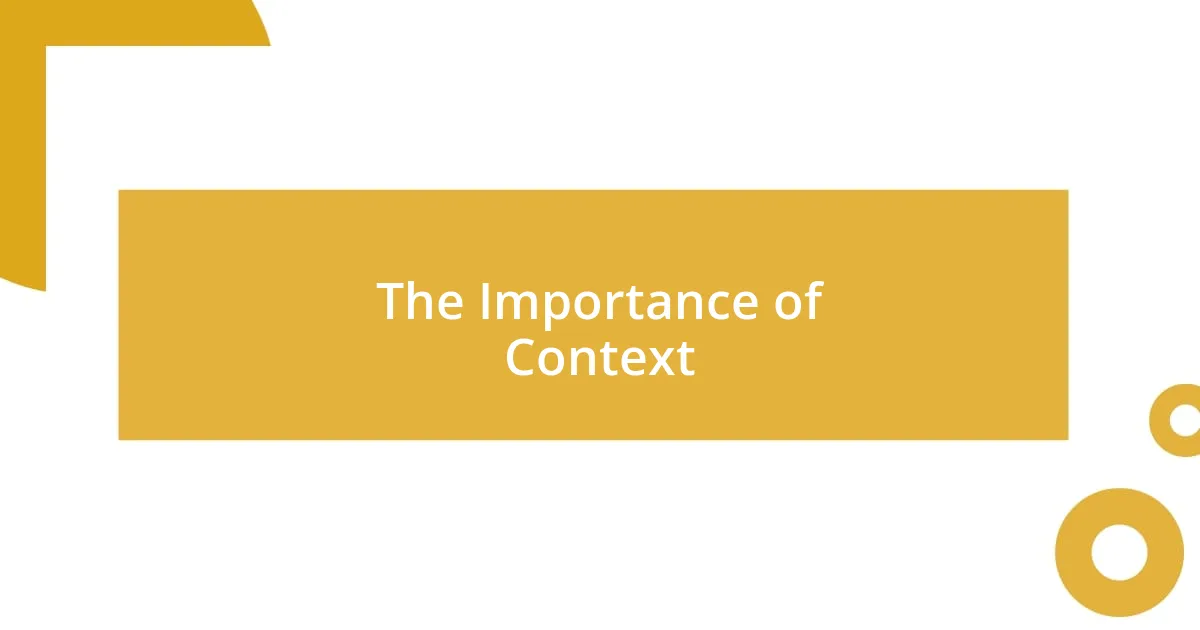
The Importance of Context
The context in which a historical fiction story is set can significantly shape the reader’s understanding and engagement with the narrative. I remember reading a novel set in ancient Rome and being captivated by how the political climate influenced personal relationships and societal norms. It made me realize that the nuances of a time period can add layers of meaning, enabling us to empathize with characters’ struggles and triumphs in ways we might not otherwise connect with.
Without proper context, the richness of a historical narrative can fall flat. I learned this while diving into a series based during the American Civil War; the detailed descriptions of economic factors and social tensions really illuminated the motivations behind each character’s actions. It’s as if I could hear the echoes of history guiding their choices. Wouldn’t you agree that understanding the bigger picture enhances our experience as readers, allowing us to appreciate the stakes involved?
Adding historical context not only enriches the storyline but also encourages readers to reflect on the present. For example, I found parallels between the struggles faced by women during the suffrage movement and those we see today regarding gender equality. It’s these connections that make historical fiction feel alive and relevant, breathing life into the past as it intertwines with our modern-day dilemmas. How do you think context shapes your interpretation of a story?
| Context in Historical Fiction | Impact on Readers |
|---|---|
| Historical Settings | Provides depth and background, enriching character motivations. |
| Political & Social Climate | Enables empathy and understanding of characters’ challenges. |
| Parallels to the Present | Encourages reflection on contemporary issues through a historical lens. |
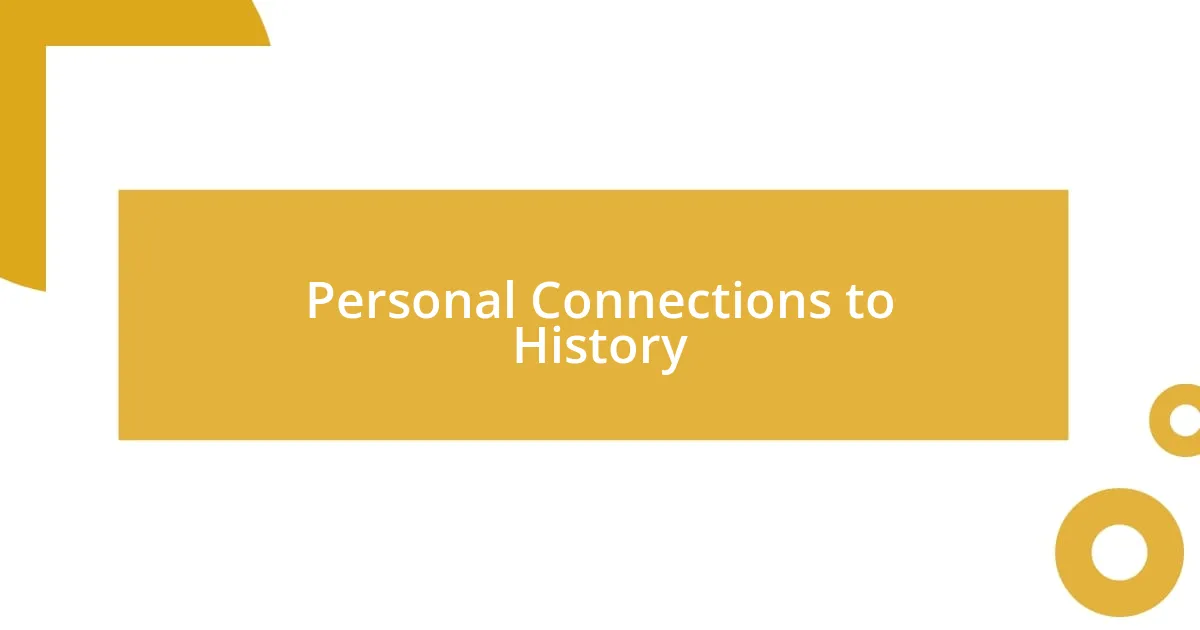
Personal Connections to History
When I think about my personal connections to history, I’m reminded of a particular summer spent exploring my grandmother’s attic. There, I stumbled upon a collection of letters from my great-grandfather, who served in World War I. Reading his heartfelt words, which captured the fears and hopes of a young soldier, transported me back in time. It made me realize that behind every historical fact lies a personal story that connects generations.
Reflecting on these experiences, I can’t help but emphasize how historical fiction allows us to forge similar connections. Here are a few thoughts that come to mind:
- Family Narratives: Personal histories, like my great-grandfather’s letters, enrich my understanding of broader historical events and foster a sense of belonging.
- Empathy Through Storytelling: Novels help me feel the emotions of those who lived in different times, making past struggles and triumphs tangible.
- Life Lessons: The decisions faced by characters often serve as mirrors, prompting me to reflect on my values and choices in today’s world.
This blend of personal narrative and collective history is what makes my connection to the past feel so alive.
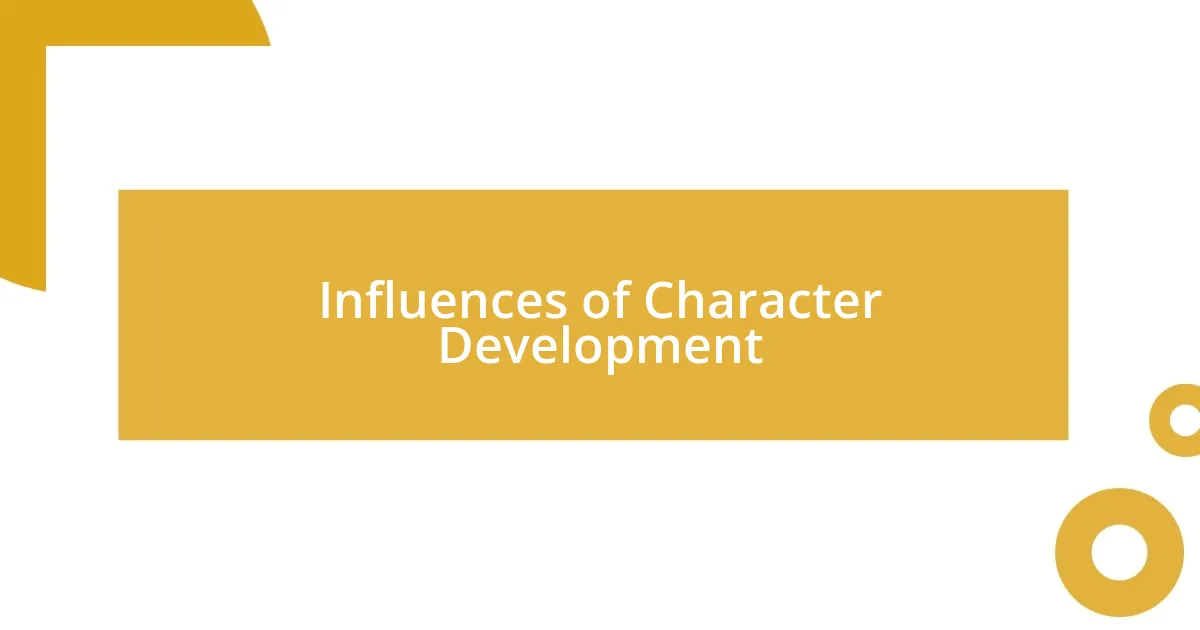
Influences of Character Development
Character development in historical fiction is deeply influenced by the societal norms and values of the era in which the story takes place. I remember reading a novel set in Victorian England where the protagonist’s aspirations clashed with the restrictive expectations of her time. It struck me how these historical constraints shaped her decisions and relationships, creating a rich tapestry of conflict and growth. Isn’t it fascinating how character journeys often mirror the zeitgeist, revealing not just personal struggles but also the greater societal battles?
Moreover, the relationships characters maintain with one another are often a reflection of their environment. While reading about the lives of soldiers during World War II, I couldn’t help but recognize the bond between comrades forged in the face of adversity. Their interactions revealed the depth of loyalty and sacrifice—qualities that I believe still resonate with us today when we face our challenges. Doesn’t the complexity of such relationships add layers to our understanding of human nature?
Then there are moments when characters confront turning points shaped by their historical context that challenge their beliefs and identities. In one instance, I encountered a character who was forced to choose between family loyalty and moral conviction during a politically turbulent time. My heart raced as I considered how different life might have been for her had she lived in a different era. Isn’t it remarkable how these pivotal moments can illuminate the timeless struggle between personal integrity and societal expectations?
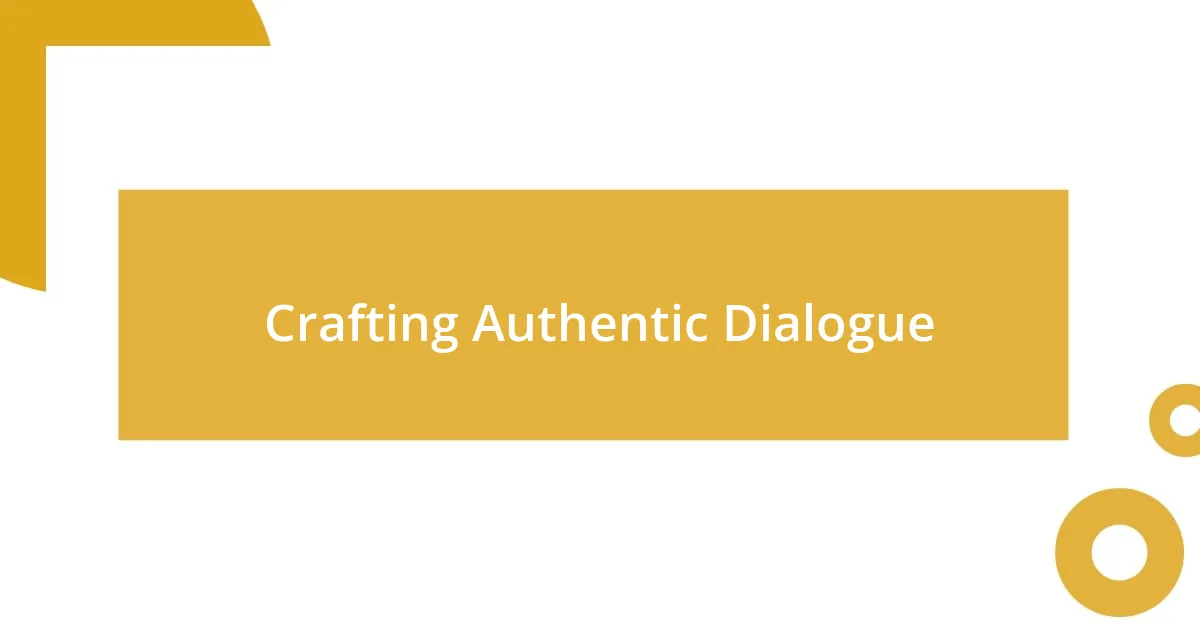
Crafting Authentic Dialogue
Crafting authentic dialogue in historical fiction is crucial to breathe life into the narrative. I often find myself captivated by how characters might speak based on their time period. For example, I recently read a book set in the 1800s, and the dialogue was laced with idioms and language structures I had to look up to fully understand. Isn’t it fascinating how a single phrase can transport you to another era?
To achieve authenticity, I believe it’s essential to really consider the characters’ backgrounds and experiences. When I write, I sketch out their life stories to ensure their words resonate with their realities. I once penned a scene between two characters from different classes, and the difference in their speech patterns revealed so much about their social status. How does one’s upbringing influence their voice in conversation? It’s a reminder that every word carries the weight of history and context.
Listening to conversations from diverse backgrounds can also enhance the realism of your dialogue. I’ve spent time in local cafes, eavesdropping on snippets of discussions, and I marvel at the unique phrases and slang people use. It’s not just about capturing the right words but also the cadence and rhythm of how they’re spoken. Have you ever noticed how dialogue can feel like music? That’s the magic I aim for in my writing, creating a soundscape that echoes the past while still feeling relatable to readers today.
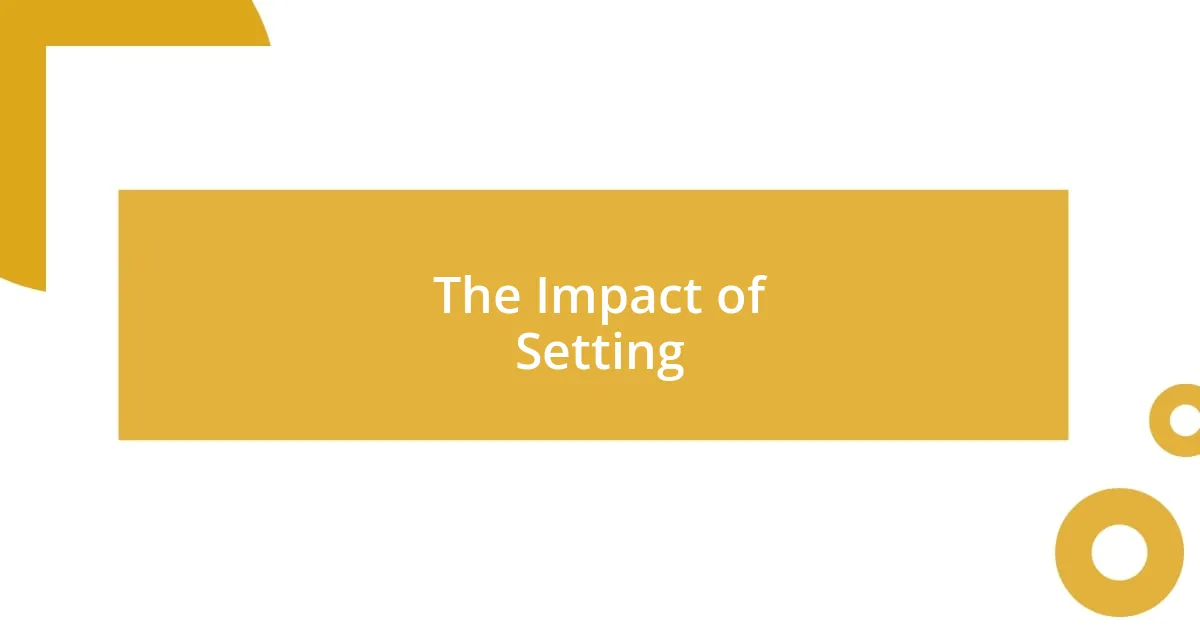
The Impact of Setting
Setting serves as a silent yet powerful character in historical fiction, impacting every aspect of the narrative. I vividly remember diving into a novel set during the Great Depression, where the stark landscapes and dusty streets painted a picture of despair that I could almost feel. The setting wasn’t just a backdrop; it shaped the characters’ daily struggles and added layers to their stories. Isn’t it intriguing how the environment can influence not just actions but emotional undertones as well?
There are moments when a meticulously crafted setting pulls me in so completely that I forget I’m reading. I recall wandering through a gripping tale set in Ancient Rome, where the bustling marketplaces and opulent villas came alive in my imagination. The smells, sounds, and sights were so vivid that I actually began to empathize with the characters, feeling the weight of their historical reality. Have you experienced that sensation where the world around the characters feels as real as your own?
The historical accuracy of a setting also ignites a desire to learn more about the time period. After reading a novel set in the Civil Rights Movement, I felt compelled to delve deeper into that era’s struggles, discovering how the locations themselves often became symbols of resistance and hope. I cherished the way the author interwove real places into the narrative, making history not just an idea, but a palpable experience. How can we not be moved when we see the spaces where history unfolded, demanding our attention and respect?
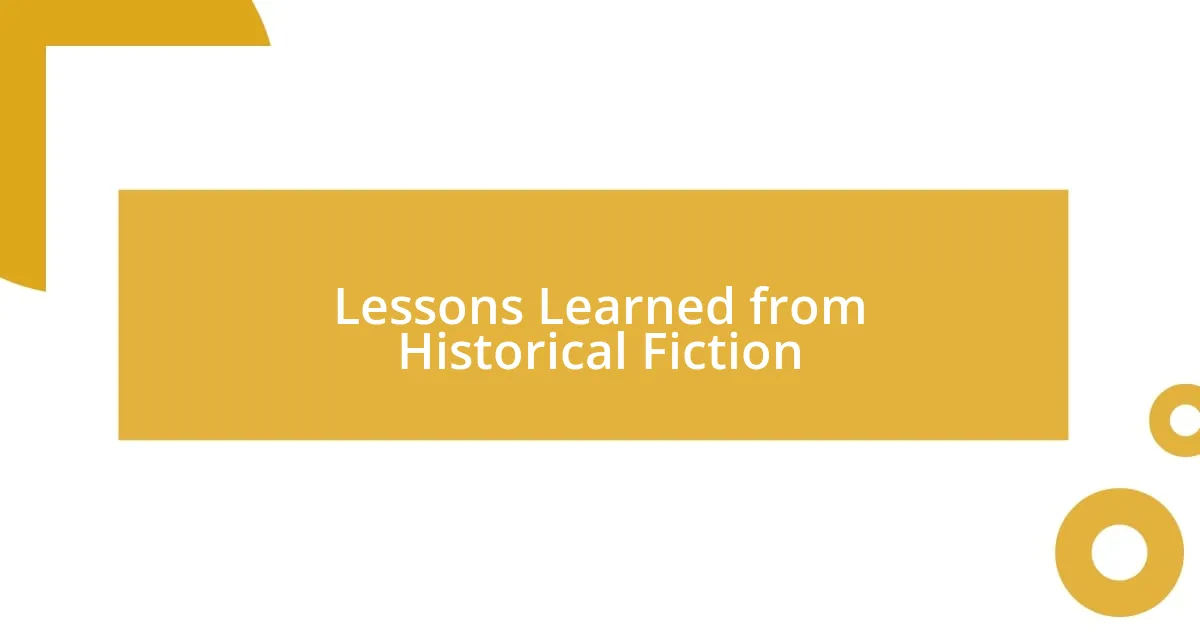
Lessons Learned from Historical Fiction
One of the most profound lessons I’ve absorbed from historical fiction is the complexity of human experience. I once read a novel about the women’s suffrage movement, which beautifully illustrated the struggles and triumphs of those advocating for change. It struck me how their passion and resilience echo through the ages, reminding me that progress rarely comes easy. How often do we overlook the sacrifices made by those who came before us? It’s a humbling realization that inspires me to appreciate and contribute to the causes I believe in.
Another valuable takeaway is the importance of empathy. I recall feeling deeply affected while reading a story set during the Holocaust. The characters were so vividly drawn that their pain and hope felt intimately real. In reflecting on their experiences, I gained a deeper understanding of the human condition, sparking conversations with friends about how such histories can resonate even in today’s world. Have you ever found yourself pondering how lessons from the past could guide present-day actions? It’s a reminder that history isn’t just a collection of facts; it holds powerful narratives that shape who we are.
Lastly, I’ve learned that courage often emerges from the most challenging circumstances. When I picked up a historical novel set during wartime, I was struck by the characters’ determination to persevere despite unimaginable hardships. Their bravery prompted me to reflect on my reactions to everyday challenges, urging me to face obstacles with a renewed sense of strength. How can we not learn from those who faced such dire situations and emerged resolute? Their stories fuel my motivation and instill a sense of gratitude for the privilege of choice in my own life.

